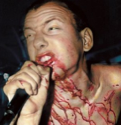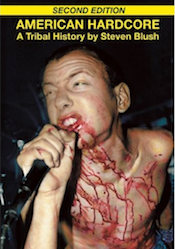
American Hardcore: A Tribal History
by Stephen Blush
Feral House

As more and more hagiographies of the hectic, violent, and oft inspirational musical phenomenon (and purely American music form) hardcore are in the offing, it is an unqualified joy to have Stephen Blush’s overview of the genre back in print. American Hardcore is 100% primary source material, rather than pop-cultural anthropology. Blush, for better or worse, was there every single night, in the audience, promoting shows, aiding, abetting, and just plain conspiring in general. He was there, and that’s a very important consideration, because it makes one much less likely to put Ian McKaye, HR, or Dave Dictor on pedestals.
Hardcore was an explosion in underground music in the early ’80s that was louder, faster, younger, and more stripped down than punk. Prime exponents were DC legends like Minor Threat and Bad Brains, Cali collectives like Black Flag and the Minutemen, and New York hellraisers like Cro Mags and Agnostic Front.
For those who have just seen the accompanying movie, I need to tell you right off the bat that American Hardcore the book is the far better experience (though the thrill of seeing Henry Rollins do a front-flip onstage unfortunately can’t be conveyed with the same immediacy on the printed page), giving a fuller, broader view of how the HC virus started, and then spread all around the country and not just (as in the film) Boston! Chicago! Austin! DC! New York! And this new, expanded edition takes things even further, fleshing out the history with more band bios and new chapters, along with oodles of new artwork and photos. The book itself follows the format of seminal underground histories like Please Kill Me and We Got The Neutron Bomb: oral histories, where the protagonists/antagonists tell their stories as they see fit, though Blush isn’t afraid to chime in with insight and occasional libelous wit. From that framework though, it expands wildly outward, far beyond the focus of similar tomes, almost becoming an encyclopedia/index, where bands who barely managed a cassette demo or a handful of gigs share page space with the likes of Corrosion of Conformity, Youth of Today, and the Necros. Which is kind of the democratizing beauty of hardcore in a nutshell.
The net result of plowing through a weighty tome like this is a sense of awe at how a bunch of (let’s be frank) kids created their own culture whole cloth – records, publications, radio shows, venues, and touring circuits – like the music industry on a Utopian, communal, microcosmic level. It’s also interesting how these bands and this music weren’t meant to last, no one was thinking of it as a career, the whole thing was in flux continuously, bands broke up on the (in hindsight) tiniest of provocations, venues opened and shut immediately, and it was good enough just to have a 7” out. This constant flux, breakneck motion forward goes some small way towards explaining why so many of hardcore’s first wave scattered so quickly with “half going metal and the other half going college rock” (see Endpoint’s Duncan Barlow in conversation). It is at this point that Blush declares hardcore to be dead and he falls into the same trap that so many hagiographers and critics do. Hardcore clearly didn’t die in the ’80s – tell that to Fucked Up, No Age, Sick of It All, or OFF! – but there’s always that temptation to unilaterally declare the era that you grew up listening to music to be the most important era. And then kids a few years younger will be thinking the exact same thing in turn. Such is the circle of life. Don’t let that fundamental flaw detract from your overall enjoyment of this book, just consider it as the first part of an ever-evolving tapestry.
Feral House: http://feralhouse.com












